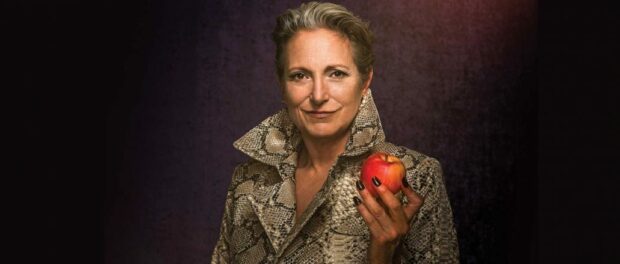Satan Found : Paradise Lost at the Centaur
“Malt does more than Milton can to justify God’s ways to man,” writes A.E. Housman. Can Erin Shields do better than malt? Not really, but that doesn’t entirely seem to be the goal in her dramatic reimagining of Milton’s 17th century epic poem, Paradise Lost at the Centaur Theatre. Erin Shields, through Satan, questions the Creator, “wise are his ways”, and does not at all seems satisfied with the patriarchal status quo created.
To begin, if you’re looking for Milton, well… it’s not. Shield’s Paradise Lost follows the same trajectory as the original but adds a blunt comedic touch and quite a bit of contemporary commentary. The jist is this: Satan is imprisoned in Hell with his fallen angels after leading an unsuccessful rebellion against God. Not ready to accept this fate, Satan returns to Earth to mess with God’s replacement creation, Adam and Eve. Using her (yes, her) rather developed EQ, Satan tricks Eve into eating the forbidden apple. Adam has a taste next. We all know where this is going.
So yes, Shields gives us a new kind of Satan – a woman. And not just any woman, but one in leather pants and short, Hillary-Clintonesque hair who espouses her beliefs that free speech and equality are preferential to servitude in heaven’s hierarchy. Amen. With a firm grasp of competence, intelligence, cunning, and grit, Lucy Peacock’s Satan is hard to resist. She’s got balls and asks the questions anyone living today (or ever) should have. Why does an omnipotent and omniscient being tolerate so much suffering and why? If God knew everything all along and planned it this way… sorta… well, that’s so damn unfair. Satan doesn’t seem impressed. It’s hard not to sympathize. At one point, as Satan points out to the audience, the debt one has with God’s love is like a paternalistic romantic relationship that only requires gratitude as payment. What ever could be less expensive than obligatory gratitude?
The acting in the show is excellent. Next to Peacock, the physical performances of Qasim Khan and Amelia Sargisson as Adam and Eve light the stage up. Adorable and in love, they stroke each other and banter in their third-person personae as the angels stand around to gawp at the coolest creatures in the new zoo. In my favourite scene, Eve convinces Adam they should spend the morning apart, indicative of just how well she knows him. Their simplicity is quickly snatched following their “fall.” Rage, fear, lust, despair arrive in a full range. Also, in a rather clever bit of costuming, the two wear body suits that hide their genitals, only to strip to full nudity post-apple.
Another kudos goes to Julie Tamiko Manning who plays Sin, a trashy loudmouthed mother. Tamkio Manning partners perfectly with Jake Wilkinson, who plays her dopey, torture-device obsessed son, Death.
The rest of the cast is good as well. God the Father, played by Marcel Jeannin, is played as a cool, corporate sort, revelling in the hymns and constant praise of angels like a CEO getting word that the company’s just been upgraded at Moody’s. He manages heaven like one long, dull board meeting where he knows everything that’s being said ahead of time. His number two, God the Son, is the only person who seems to break up his boredom, even though God the Son is mostly a lapdog, tailing behind God the Father at the ankles, having well-heeled discussions on free-will… At least things go this way until the lives of the two humans are at stake. In terms of father-son fight decibels, this was a pretty good one.
The rest of the cast, the angels/fallen angels all have their moments. It’s a young, multicultural cast who take on a wide variety of tasks, whether singing praises or sword fighting, that act as a sort of Greek chorus. Many have praised the play-within-a-play, Raphael’s way of retelling of the story of the heavenly war to Adam and Eve. It is blunt comedy, reminiscent of an elementary school play with forgotten lines and Dollar store costumes.
On the whole, though, the stage crew provides many nice touches – Satan’s teasing first appearance on stage, for example, with just her upper body poking through the hole in the floor builds anticipation, while reversing the concept of “falling” into “rising”. The set has an intriguing mound of button down shirts that suggest a lifetime of cubicle drudgery for the generations of humans yet to come. The ascending but incomplete ladder and the steps behind it make for an effective, multi-level stage These are used to fine advantage.
The main problems lie in the script itself. The show runs long – and though this production keeps the energy and the comedy throughout, it sprawls. The scenes with Sin and Death, and Raphael’s play-in-a-play are probably the funniest, but they felt incidental. Also, how many times do I need to see Eve sink her teeth into a “juicy” fruit? While the show doesn’t drag because of the fine cast, it balances precariously on the border of conceit.
Overall, it’s a fine production and the acting and excellent touches to scenery and costumes, as well as its humour make it a worthy show.
Paradise Lost is at the Centaur Theatre (453 St Francois Xavier St) until February 2, 2020. Post-Show Talkbacks take place January 23 and January 26. French Subtitles are available Friday, January 31 at 8 PM and on Saturday, February 1 at 8 PM. Regular showtimes are Tuesdays through Saturdays at 8 p.m., with matinées on Saturday and Sunday at 2 p.m. Click here for ticket details.






